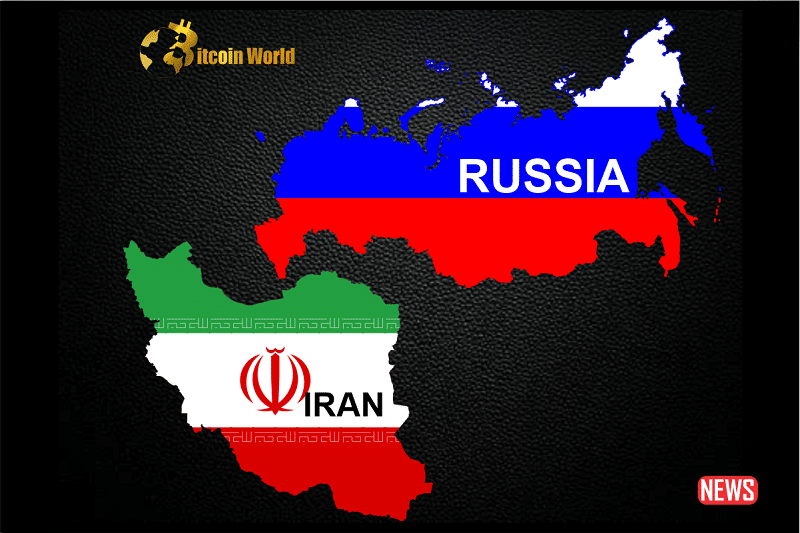Imagine a world where international trade isn’t dictated by traditional banking systems, a world where digital currencies pave the way for new economic alliances. That’s precisely the scenario unfolding as Russia and Iran, both facing significant international sanctions, are actively exploring the potential of digital tokens to foster trade. Curious how this works? Let’s dive in.
Why Crypto? A Sanctions-Busting Strategy?
Recently, key players from Russia and Iran’s burgeoning crypto and fintech industries met in Tehran at the International Exhibition of Financial Industries. The core topic? Leveraging the power of digital tokens to navigate the complex web of international sanctions and ignite trade between the two nations. While no official Russian government representatives were present, the presence of industry heavyweights like Alexander Brazhnikov, Executive Director of the Russian Association of the Cryptocurrency and Blockchain Industry (RACIB), and Mustafa Amiri, Secretary of the Iranian Fintech Association, spoke volumes about the seriousness of these discussions.
Navigating the Regulatory Maze: What’s Changing?
A significant part of the conversation revolved around the evolving regulatory landscape for cryptocurrencies in both countries. Here’s a quick breakdown:
- Russia’s Anticipation: Brazhnikov shared his optimism about upcoming legislation in Russia, potentially taking effect as early as September. This legislation is expected to legalize crypto for international trade, a crucial step for Moscow as it seeks alternatives to US dollar-dominated transactions.
- Pilot Programs in Play: The Russian Central Bank is considering a “pilot” program to oversee trading companies involved in crypto transactions. Interestingly, Rosbank is reportedly already piloting a similar initiative for Russian businesses.
- Iran’s Fintech Focus: Mustafa Amiri’s presence highlighted Iran’s active fintech sector and their keen interest in utilizing digital currencies for international commerce.
Banking Regulations? Not a Roadblock for Crypto Trade?
Interestingly, Brazhnikov offered a perspective that might surprise some. He suggested that companies looking to trade using crypto instead of traditional currencies don’t necessarily need to be overly concerned with traditional banking sector regulations. Why? Because the infrastructure for crypto trade is different. Crypto brokerages and exchanges take center stage in facilitating these transactions in Russia.
Furthermore, RACIB pointed to existing connections between crypto exchanges in Moscow and Iranian companies, hinting at potential collaborations and established pathways for this new form of trade.
Early Signs and Lingering Questions: Is Crypto Trade Already Happening?
While official confirmation might be pending, there are indications that crypto-powered trade between Russia and Iran isn’t just a future possibility – it might already be underway. Consider these points:
- Past Discussions: The idea of a jointly launched gold-pegged stablecoin has been floated in the past, suggesting a long-term interest in this area.
- Early Adoption?: Some believe crypto trade between the two nations might have started as far back as 2019.
- The Unregulated Space: Reports have surfaced about unlicensed crypto exchanges and peer-to-peer (P2P) traders using Russian commercial bank accounts to process crypto sales. This raises some eyebrows about potential reputational risks for traditional financial institutions.
The Benefits and the Bumps in the Road
The potential benefits of using crypto for trade between Russia and Iran are clear, primarily bypassing international sanctions and fostering economic cooperation. However, there are challenges to consider:
| Benefits | Challenges |
|---|---|
| Circumventing international sanctions | Regulatory uncertainty and evolving frameworks |
| Facilitating trade and economic growth | Risks associated with unlicensed exchanges and P2P trading |
| Reducing reliance on the US dollar | Potential for increased scrutiny from international bodies |
| Creating new financial partnerships | Volatility of cryptocurrency markets |
Actionable Insights: What Does This Mean for the Future?
This collaboration between Russia and Iran in the crypto space offers several key takeaways:
- Geopolitical Shift: The move highlights a growing trend of nations seeking alternatives to traditional financial systems, particularly when facing international pressure.
- Fintech Innovation: It underscores the innovative potential of fintech and cryptocurrencies in reshaping international trade.
- Regulatory Watch: Keep a close eye on the upcoming legislation in Russia and how it will impact crypto trade.
- Business Opportunities: For businesses in both countries, this could open up new avenues for trade and partnerships.
Looking Ahead: A New Era of Economic Cooperation?
The discussions in Tehran signal a significant step towards enhanced economic cooperation between Russia and Iran, powered by the innovative potential of digital tokens. While challenges remain, particularly concerning the regulation of the crypto space, the momentum is undeniable. As Russia actively seeks to lessen its dependence on the US dollar and Iran navigates its own set of sanctions, the strategic use of cryptocurrency is emerging as a powerful tool. The world watches as this digital dance unfolds, potentially reshaping the landscape of international trade and economic alliances.
Disclaimer: The information provided is not trading advice, Bitcoinworld.co.in holds no liability for any investments made based on the information provided on this page. We strongly recommend independent research and/or consultation with a qualified professional before making any investment decisions.


